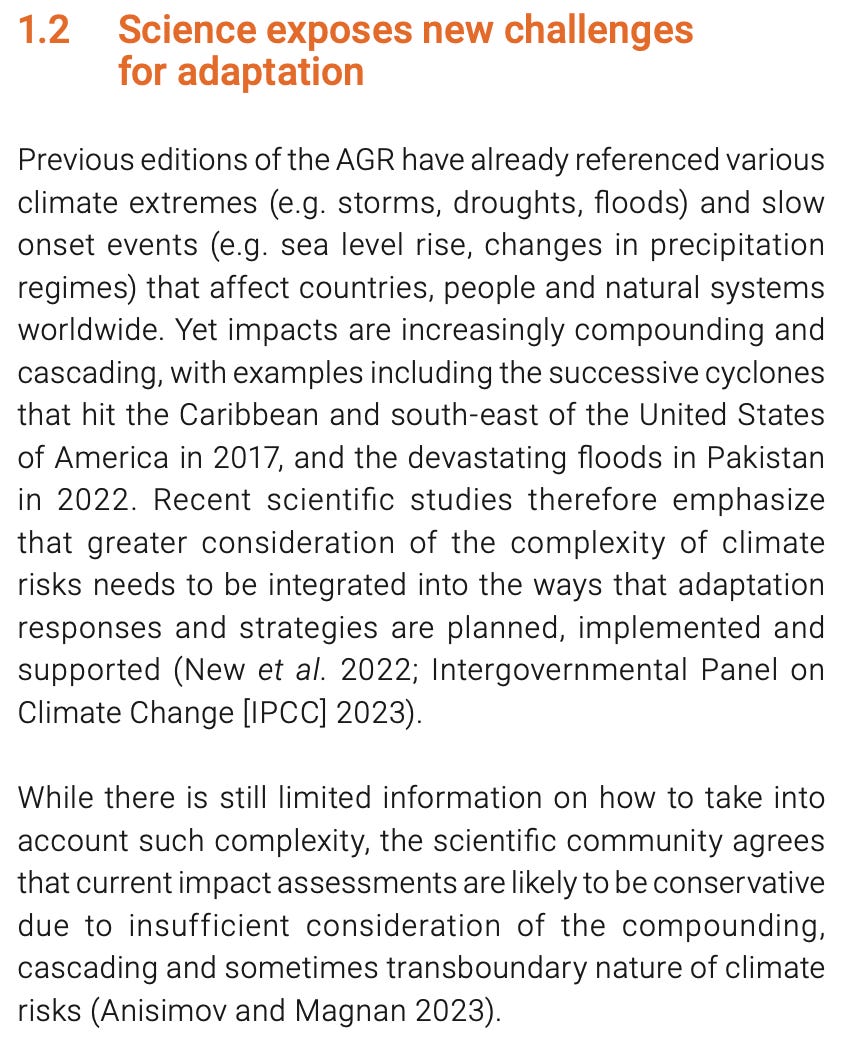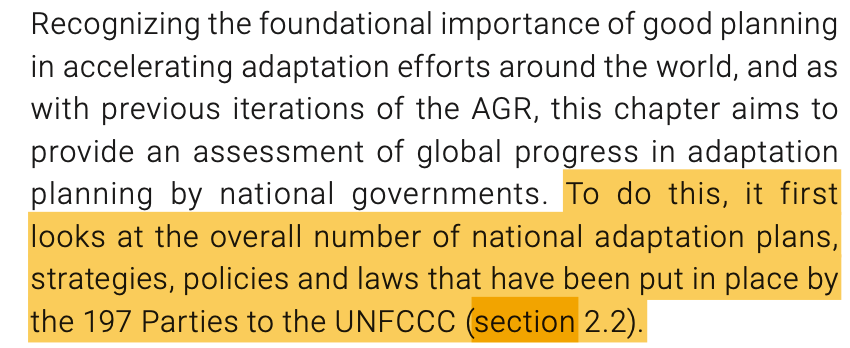The Kāpiti coastline in New Zealand, approximately 38km long, is in the firing line for managed retreat and/ or prohibitively expensive disaster adaption/ mitigation strategies, uninsurable homes, plummeting house prices (Kapiti coastline circled in map).
Whatever country we are in we are going to be affected under a Climate Adaption Plan. The United Nations Environmental Program (UNEP) report Adaption gap report 2023 UNEP: Underfinanced. Underprepared. Inadequate investment and planning on climate adaptation leaves world exposed states:
According to the UNEP this percentage is set to escalate as the trend continues to escalate risks.
BBC article Is the world ready for mass migration due to climate change? states”
I spoke to Tanya Lees and Carrie Evans from Kapiti Calm New Zealand regarding:
Reports highlighting plans for managed retreat (removal from property) in Kapiti.
Certificates put on houses documenting coastal erosion, affecting insurance and property prices- the home owners were not told that this occurred.
Pathway costs for disaster adaption and mitigation strategies in the millions (who pays?)
Reports using the highest climate catastrophic modelling possible.
Obscuration of Council community consultation processes.
Managed retreat is the removal of people’s properties and/ or infrastructure away from areas deemed too risky to live in. Managed retreat historically focused on removal due to a natural disaster, now it will be pre-emptive based on climate change modelling. I have covered this topic extensively in previous articles - with a focus on Australia. Links to my articles at bottom of article.
The UNEP report gives the following definitions:
Adaptation: The process of adjustment to actual or expected climate and its effects. In human systems, adaptation seeks to moderate or avoid harm or exploit beneficial opportunities. In some natural systems, human intervention may facilitate adjustment to expected climate and its effects (IPCC 20221).
Mitigation (of climate change): A human intervention to reduce the sources or enhance the sinks of greenhouse gases (IPCC 20221).
New Zealand
In 2020 the Kapiti Coast District Council established a Coastal Advisory Panel (CAP) to guide responses to “projected” sea ocean rise. They state “there is still much uncertainty about how significant these challenges will be…” yet they’re going full steam ahead on the most extreme climate modelling in their suggested strategies.
The Chair of CAP is James Bolger. Mr Bolger was Prime Minister of New Zealand between 1990 to 1997, thereby signing up New Zealand to Agenda 21 in 1992.
Community consultation?
In the interview above Tanya and Carrie both mention that the community of Kapiti was almost completely unaware of the CAP committee and its “community consultation” role. So much that a group of residents in Kapiti had to do CAP’s job for them and letter box drop, leading to a much larger number of residents coming to a CAP community consultation meeting - which led to this:
The playbook for government led community consultations is to not let the public know about them. How difficult it is when the community turns up and wants answers (below exchange between Tanya Lees and Jim Bolger is documented in the video above). :
Contrast this with Bolger’s statement in the REPORT OF THE INDEPENDENT COASTAL ADVISORY PANEL and note the framing of the word “wellbeing”:
The word “wellbeing” is cropping up everywhere. Bolger is using it to imply that those who are concerned about the Coastal Adaption recommendations orchestrated through CAP are a threat to the wellbeing of the “community”. That’s the playbook implemented for anyone speaking out against a plethora of carefully crafted global narratives.
In the interview above Tanya Lees (spokesperson from CALM) states she heard about the Coastal Advisory Panel (CAP) plans when she attended a CAP meeting in Kapiti in 2023. This was CAP’s third community meeting. Tanya goes on to explain ”they (CAP) had two other ones but they weren’t widely advertised, so the numbers were like 20-30 people, so it was pretty much kept on the down low. For the third community consultation meeting “some clever people had gone out and tipped the community off, putting flyers to letterboxes. So for this particular meeting 200 people showed up for that.”
Carrie Evans, member of CALM states that prior to the third community consultation meeting “.. a friend went to another meeting .. there were maybe 30 to 40 people there, and most of them were from the Council or Jacob’s Consultancy who wrote a very voluminous couple of reports for the Council on adaptation.. so there were a lot of officials and very few people from the public.. so that’s when we decided to get cracking and alert the community.”
These testimonies highlight CAP did an appalling job of engaging with the community, and it has been up to concerned community members to create flyers and letter box drop to alert people to the CAP meetings. Tip to Council and Advisory Panels, if you are holding community meetings regarding issues as important as removal of property rights and enormous costs for adaption plans, and you only have a handful of community members turn up- your engagement strategy is not working.
Tanya and Carrie go on to document that the coastal erosion warnings were put on home owner’s house certificates, without even notifying home owners. Not very transparent New Zealand government.
Tanya rightly identifies CAP community consultation methods were straight out of the Delphi handbook. Rosa Koire described the Delphi method here:
The Adaption gap report 2023 UNEP, in relation to community consultation (yes, the community is meant to be a stakeholder) states (AGR stands for Adaption Gap Report):
The 197 parties to the UNFCCC are meant to create “inclusive” adaption plans. Which means, in this context, that people affected are actually aware that a community consultation is in place and feel a sense of ownership over the strategies being implemented.
The UNEP states countries are increasingly successful with their equitable adaption planning, and that stakeholders are engaged. What’s the bet the Australian and New Zealand government are assessing their adaptation plans as inclusive? The problem is the vast majority of the population have no idea these plans are in motion; that their property rights are at risk, the plans discuss moving “communities” together, their capacity to get insurance is increasingly threatened, and that the measures to be implemented will be so costly that people will have to sell up (for reduced prices due to climate change modelling).
As a further example of the fraudulent “inclusive” model, the NSW Government Disaster Mitigation Plan (which outlines managed retreat, legislation which allows the government to remove you from your home due to perceived risks and then on sell your land, adaption and mitigation plans) consulted with 35 community members through two online sessions. This utter farce of community consultation leaves me speechless!
But, let’s not let the facts get in the way of the UNEP’s narrative that the “community” is on board and engaged.
United Nations overseeing Climate Adaption Plans
Page 23 of the UNEP report states:
You may find your countries Climate Adaption Plan here:
The United Nations Environment Program oversees the process for countries to create their Climate Adaption Plans:
UNEP partners here:
It is (of course) the Public, Private, Partnership (PPP) nightmare of global banks, Foundations, unnamed private interests, government as the lackeys putting these global plans in to action, and the sprinkling of NGO’s; chosen “Thought Leader” Civil Society and Activist groups to give the PPP the illusion of democracy.
Best exemplified by Iain Davis in his article What is the Global Public-Private Partnership
Climate Adaption! Managed Retreat! Uninsurable Homes! Infrastructure companies stopping services! Council stopping services! It is on our doorstep! We need a lot more people getting in the arena, asking questions and raising concerns.
Get in touch with Kapiti Calm here
My previous articles on Managed Retreat- Uninsurable Homes:
https://kate739.substack.com/p/1-in-25-australian-homes-uninsurable
https://kate739.substack.com/p/coastal-erosion-uninsurable-homes
https://kate739.substack.com/p/managed-retreat-nsw-australia
https://kate739.substack.com/p/6-cities-plan-wef-rockefeller-and































“Managed retreat historically focused on removal due to a natural disaster, now it will be pre-emptive based on climate change modelling.” — How very Minority Report'ish precrime of them! Anything for the public good.
From Kate Green's article: “But Bolger said claims he acted with bias were nonsense, and as a Kāpiti resident himself, when it came to managed retreat he believed in the science.” — With all due respect to Kate Green, I believe she misspelled science. I believe “$cience” is the correct spelling.
Is it T-shirt time yet? Front: “Wellbeing”. Back: “Brought to you / by the people / who want you dead!”
The timing of Rosa Koire's demise, with respect to operations like “managed retreat”, reminds me of the timing of Kary Mullis's death, with respect to “PCR testing” … the timing of both were as good for the forces of evil, as they were bad for the forces of good.
Our political class and their dutiful bureaucrats are becoming increasing skilled at non-consultation using using their Rand Delphi / IAP2 methods. This is a much more dangerous planet than any of us realised. The one thing we must not do is seek to understand or ask what is causing these problems or to contextualise them. A short memory of past is also an aid in presenting every minor event as novel.
Secrecy around important decisions such as you have highlighted here, Kate, are the norm. To ask questions makes one annoying at best or if you ask a good question, a conspiracy theorist. We are meant to be merely fearful and reactive.
Here's a theory. You mention the 2023 UN Adaptation Gap Report and this statement: "Underfinanced. Underprepared. Inadequate investment and planning on climate adaptation leaves world exposed
states". On page 48, 55 reference is made to the term 'fiscal space" which relates to funds that are expected to be set aside to meet climate change responsibilities. This is a large part of what the Conference of Parties (COP 28) meetings are about where the world's leading financial organizations come together to discuss predation on countries that can't meet their climate targets. And here is the trick. As the climate problem is for the large part artificial, the amount of money to fix any problem can be as big as the COP players and any compliant or subject government wants them to be. The IMF is a player here too with its Special Drawing Rights.
This is about building this new world "Back Better". One problem is that many of us remember an old world where our politicians were expected to at least pretend they were serving our interests. Now we are getting complete disdain.
The focus is on the young, as Ben Williamson described, this master class is building a new world with people to fit in it. The problem is that people of my generation don't fit it at all. The other problem is that we have the property that all of this Managed Retreat is designed to take. So they have to get it from us first. The young have already been dispossessed by usurious banks and the lending policies they have allowed to indulge in.
Thanks for your work, Kate. It is very important. Good luck the people in Kapiti. We are with you in spirit and friendship. Our traitorous leadership must NOT be allowed to get away with this. Their time is over.